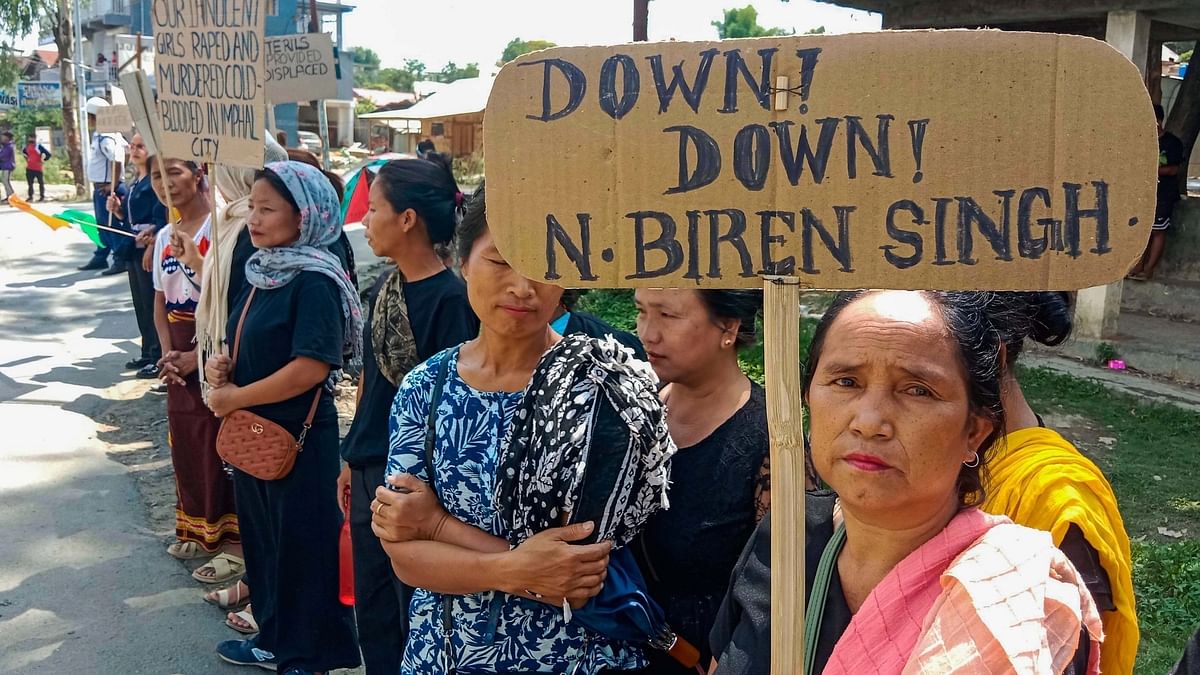2 Kuki women paraded naked, allegedly gangraped in Manipur 2023

2 Kuki women paraded naked, allegedly gangraped in Manipur 2023
Violence-hit This week, Manipur experienced further anger as a result of a viral video showing two Kuki-Zo tribal women being paraded naked before being gang-raped. The act, which the Indigenous Tribal Leaders’ Forum angrily denounced, is said to have occurred in the Kangpokpi area following the burning of B Phainom hamlet. According to the ITLF, the mob killed two males before turning on the two ladies.
Reports citing an ITLF statement claim that the event happened on May 4. The two ladies are shown in the now-viral video being paraded in public naked before a sizable crowd as they make their way to a paddy field to be gang-raped. According to ITLF, males could be seen repeatedly abusing the defenceless ladies as they begged and called for rescue from their captors.

In an incident that has sparked national and international outrage, two Kuki women from Manipur, India, were allegedly subjected to brutal physical and sexual violence, with their ordeals reportedly filmed and shared widely on social media platforms. The egregious abuse that the women experienced has led to a widespread outcry for justice, igniting discussions on systemic misogyny, sexual violence, and the human rights situation in the North-Eastern part of India.
In the heart of Manipur, a North-Eastern state of India, two women from the Kuki community were allegedly abducted, gang-raped, and paraded naked. Reportedly, these horrific acts were videotaped by the perpetrators and uploaded to social media, triggering widespread shock and disgust.
The frightening footage has also been shared on social media, where it has amassed hundreds of videos and drawn condemnation. However, Mint could not independently verify the information provided by ITLF on the footage.
Over the last two months, Manipur has been plagued by violent confrontations between several communities, resulting in at least 100 fatalities and numerous injuries. Officials warned on Wednesday that the warring groups in the strife-torn state still possess over six lakh rounds and over 3,000 guns. Experts have also expressed concern over the potential for outlawed terror organizations to resurface in the form.

Pralhad Joshi, the minister for parliamentary affairs, stated on Wednesday that the administration was prepared for a discussion on the Manipur situation during the Monsoon Session of Parliament. Still, he referred to the opposition’s demand for a statement from Prime Minister Narendra Modi on the matter as a “caveat for disruption.”
The video that emerged on social media is a chilling testament to the inhumanity the women faced. Although the footage has since been taken down from most platforms due to its graphic and distressing nature, the images and the abuse narrative have already incited a strong response, both locally and internationally.
The issue came into the limelight when several Kuki civil societies and women’s rights organizations raised their voices, demanding swift and stringent action against the perpetrators. As the news spread, it sparked widespread outrage, protests, and demonstrations in Manipur and across India.
The central and state governments have been criticized for their slow response, with many citizens and advocacy groups accusing them of disregarding the rampant gender-based violence plaguing India’s more marginalized communities. Human rights groups, women’s rights organizations, and international observers have called for an immediate and thorough investigation, coupled with the delivery of swift justice.

In response to the mounting public pressure, the Manipur State Government has assured that a special investigative team has been established to probe the incident. However, citizens are sceptical about these promises, citing past incidents where justice was delayed or denied altogether.
This incident also brings the issue of racial and ethnic tensions in the region. Like several other North-Eastern states, Manipur has a complex history marked by ethnic strife and separatist movements, and incidents such as this one only add to the complicated socio-political scenario.
These horrific events are a painful reminder of the deeply entrenched problems in India’s society, where women, especially those from marginalized communities, continue to be victims of sexual violence. The incident also highlights the urgent need for stringent laws, education and awareness, and societal reforms to combat the menace of gender-based violence, with a particular focus on protecting the vulnerable and marginalized.

In the face of such atrocities, it is necessary to amplify the voices of victims and their communities, striving for justice and reforms in the system. The fight is not just for the Kuki women but for every woman who has faced or might face such violence. Society must rise against such heinous acts and work together to build an environment where women feel safe and respected.
While incredibly tragic and inhumane, this incident has provided an unfortunate impetus for reform. It has ignited a conversation about gender-based violence and the need for broader societal change in India. It is imperative that the spark of this conversation isn’t lost in the news cycle but leads to tangible, meaningful action that helps eradicate such vile acts from society. The case of these Kuki women should be a rallying cry for reform, not just a footnote in a long list of similar, overlooked incidents.



